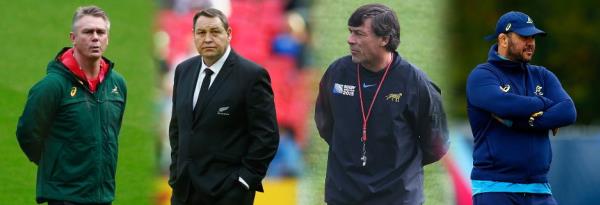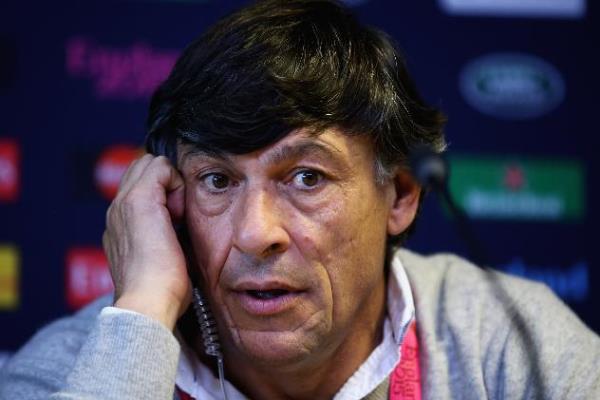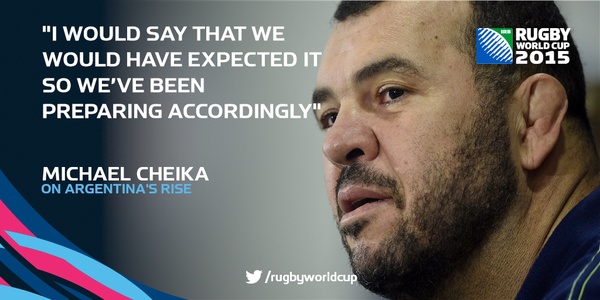
Heyneke Meyer, Steve Hansen, Daniel Hourcade & Michael Cheika… the 4 Rugby World Cup 2015 SEMIFINALS coaches
For the 4 coaches of the Rugby World Cup semifinalists – Argentina’s Daniel Hourcade, Australia’s Michael Cheika, New Zealand’s Steve Hansen and South Africa’s Heyneke Meyer – the coming weekend promises to be a defining moment in their careers.
Win and they can look forward to leading their teams out for the Rugby World Cup final at Twickenham Stadium next Saturday, lose and they will be left to prepare for Friday night’s bronze medal match at the Olympic stadium, wondering what might have been.
Hansen summed up the contrast earlier in the week: “You either stand up and be counted or go home. Even worse, you have to play that other game.”
One thing the coaches share is that none had spectacular playing careers – Cheika’s Australia Under 21 caps represent the closest any of them came to international rugby – though all 4 have worked tirelessly as coaches to earn the positions they currently occupy.
Hansen steps out of the shadows:
Of the 4, Steve Hansen is the only 1 who knows what it takes to coach a side to Rugby World Cup triumph. He was Graham Henry’s assistant 4 years ago, when New Zealand ended their 24-year wait to lift the Webb Ellis Cup, before succeeding Henry in the top position.
While many sides find their form drops after such a success, the former policeman has done the opposite and made the All Blacks even better.
In the 4 years since Richie McCaw lifted the trophy at Eden Park, New Zealand have lost just 3 times – not a bad record for a coach who was seen primarily as an assistant rather than the main man.
It was the 2nd time in his career that Hansen has succeeded Henry. Back in 2002 when Henry stood down as Wales coach, Hansen took over.
While there were calls for his dismissal after a run of 11 consecutive defeats, he took Wales back to their classic running style at the 2003 World Cup, propelling them to the quarterfinals where they scared England to their core before going out.
It meant Hansen could return home with his head held high to take up the assistant’s position alongside Henry in 2005.
Father figure Hourcade:
Of the quartet Hourcade is probably the least well known, even though this is his 2nd Rugby World Cup as head coach, having led Portugal during their Rugby World Cup debut in 2007.

Daniel Hourcade
But Hourcade’s key work came with the Pampas XV, an Argentinian development side that played in South Africa’s Vodacom Cup tournament, and the Argentina Jaguars, Argentina’s 2nd team.
This allowed him to blood a host of youngsters who were able to learn and gain experience from the fierce level of competition and then progress to the Jaguars, where they developed further. Many now make up the Argentina squad that Hourcade has led since November 2013, and which has won plaudits for its multi-faceted attacking style.
“I 1st met Daniel when I was playing in the Pampas XV in 2010, when I was 20,” Pumas scrumhalf Tomas Cubelli said. “I knew what his ability was like because we had a successful team and played really enjoyable rugby.”
Meyer the survivor:
South African Springbok coach Heyneke Meyer might have been here 4 years earlier. After the Springboks won their 2nd Rugby World Cup title in 2007, a success founded on Meyer’s Super Rugby-winning Vodacom Bulls, Meyer was the favourite to succeed Jake White in the top job, but the position went to Peter de Villiers instead.
Meyer was eventually appointed in 2012, and there is a sense of relief that his side are still on course for glory after their opening match defeat to Japan.
“It feels like I still need some oxygen,” Meyer said after his side reached the semifinals. “I want to thank the people back home. Since the Japan game the support has been unbelievable and we have got tears in our eyes.”
Meyer assisted South Africa coach Nick Mallett at the 1999 World Cup and then led the Blue Bulls to their 2002, 2003 and 2004 Currie Cup titles, South Africa’s premier domestic title. Many of Meyer’s Blue Bulls squad played in South Africa’s 2007 triumph, and he turned to 1 of them in his hour of need this time around.
Scrumhalf Fourie du Preez stepped up as captain when Jean De Villiers was ruled out with injury, and again as the try-scoring hero in the quarterfinal against Wales when the clocking was running down.
“He is the most astute player I have ever coached,” Meyer said after the quarterfinal. “He is a tactical genius. He came up with that move (off the back of the scrum which led to the winning try) and the try was pure genius.”
Cheika takes care of business:
If Michael Cheika could be summed up in 1 word it is ‘winner’. Throughout his coaching career the Wallabies coach has amassed a haul of silverware and much of it in double-quick time. In particular, he takes hold of teams that have a reputation for underachievement and takes them to the top.

Michael Cheika
When he joined Leinster, they were viewed as a bunch of flash Dubliners who could not compete with the more earthy charms of Munster or Ulster, let alone the rest of Europe, but by the time he left in 2009 they had won the European Cup for the 1st time.
He later moved to France and took over at Stade Francais, who were in a financial quagmire and releasing players as quickly as possible. Cheika used the business nous that had allowed him to become a millionaire owner of a fashion distribution business to restructure the club from top to bottom. He also took the Parisians to the European Challenge Cup final, where they lost narrowly to Harlequins.
In 2012 he returned home to Sydney and the Waratahs, a side that had threatened to win Super Rugby on occasions but who were widely viewed as a soft touch.
Under Cheika, Michael Hooper captained the side as they won their 1st title in 2014, with current Wallabies flyhalf Bernard Foley pulling the strings and Adam Ashely-Cooper and Israel Folau lighting up an exciting backline. When Ewan McKenzie’s term as Wallabies coach came to an end last year, there was only 1 man the Australian Rugby Union could turn to, to lead Australia at Rugby World Cup 2015 in England.
“It’s about making sure you get the best out of yourself so you can make the most of your life,” Cheika said earlier in the tournament. “Not many people have worn the Australia jersey in rugby, so from someone who never played I tell them to make the most of that opportunity.”
From the 4 I would say Hourcade has been the most impressive IMO.
What Argentina have become since he took over is by far the most impressive feat.
One can only wonder what Cheika might have done if he too had 4 years with the Wallabies instead of only one, but they have made huge strides in that one year.
@ nortie:
Would concur with your statement.
Of course if HM brings the WET home he will probably get appointed as Sports Minister AND Higher Education Minister in a newly condensed portfolio and he will receive an Honoury Doctorate from the University of Port Hare.
Shyte, his acolytes will be unbearable.
😀
Users Online
Total 94 users including 0 member, 94 guests, 0 bot online
Most users ever online were 3735, on 31 August 2022 @ 6:23 pm